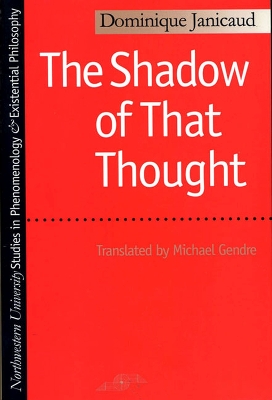Studies in Phenomenology and Existential Philosophy
2 total works
Janicaud draws a firm connection between Heidegger's philosophical position and his political engagement. He thus goes beyond those writers who attempt to handle the issue of Heidegger's Nazism simply on the level of his personal political judgment, in isolation from his philosophy, by attempting to distinguish rigorously between the thinker and the man. Janicaud's calm rejection of this approach, his refusal to salvage the philosopher from the wreck of the man, is an original contribution to this complex and emotional debate.
Janicaud draws a firm connection between Heidegger's philosophical position and his political engagement. He thus goes beyond those writers who attempt to handle the issue of Heidegger's Nazism simply on the level of his personal political judgment, in isolation from his philosophy, by attempting to distinguish rigorously between the thinker and the man. Janicaud's calm rejection of this approach, his refusal to salvage the philosopher from the wreck of the man, is an original contribution to this complex and emotional debate.

